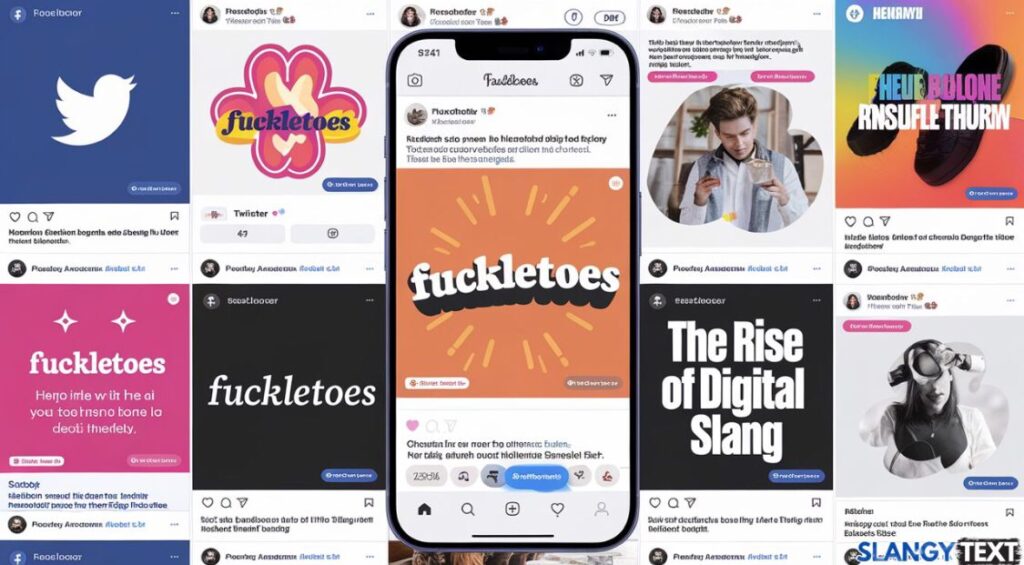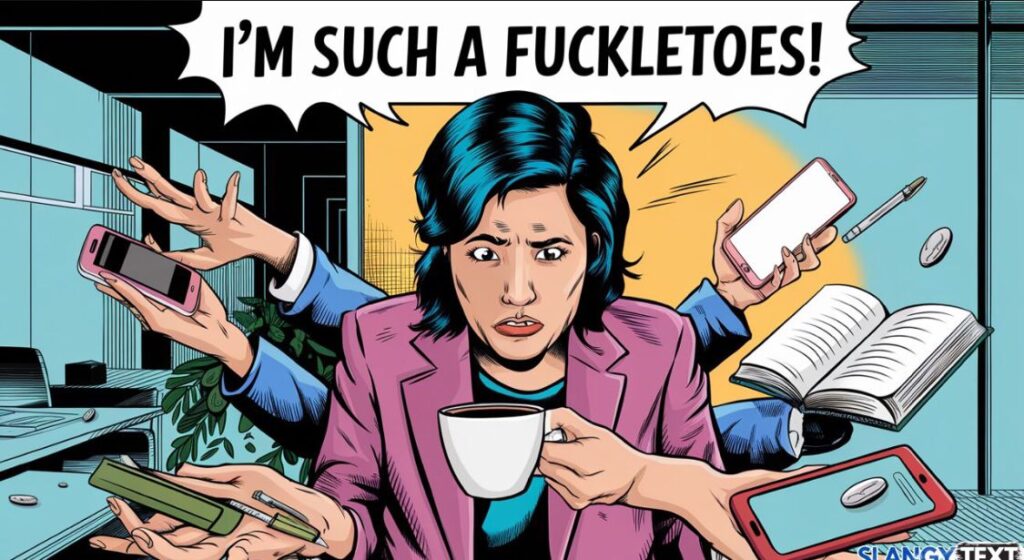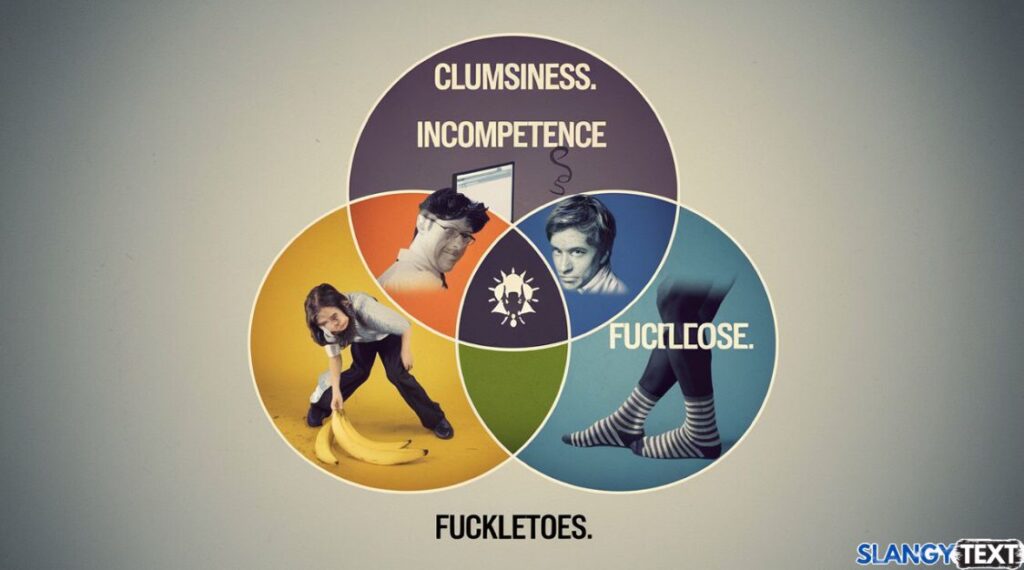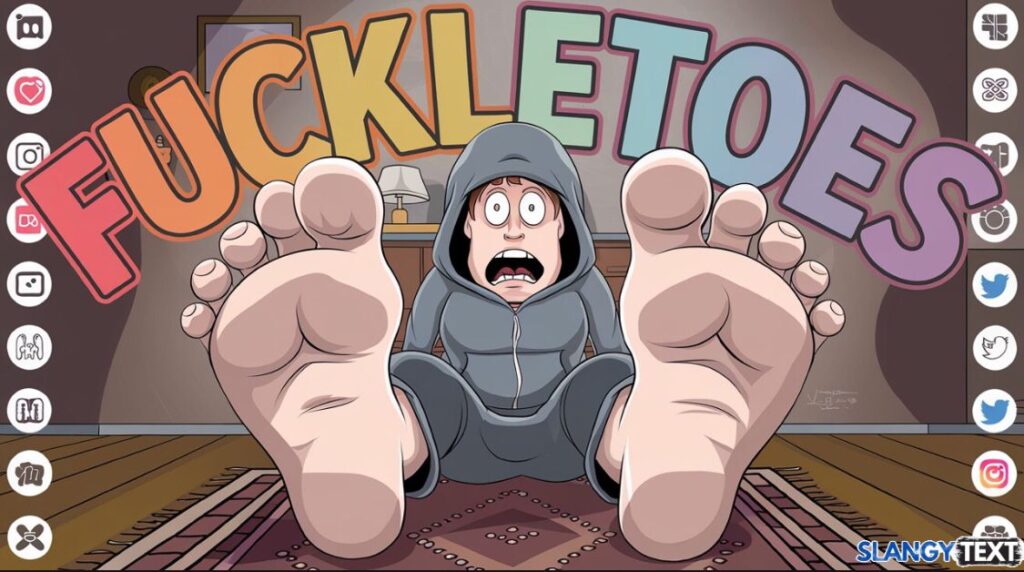In the ever-evolving landscape of modern slang, new words and phrases constantly emerge, leaving many scratching their heads in confusion. One such term that has recently gained traction is “fuckletoes.”
This peculiar word has found its way into casual conversations, social media posts, and even text messages, prompting many to wonder about its meaning and proper usage.
The Origins of Fuckletoes
The term “fuckletoes” is a made-up word that combines two distinct elements: “fuck” and “toes.” While its exact origins remain unclear, it’s believed to have emerged from online communities and social media platforms as a creative way to describe someone who is particularly clumsy or awkward.
Unpacking the Meaning
At its core, fuckletoes is an informal and potentially insulting term used to describe someone who is exceptionally clumsy, awkward, or prone to making mistakes. It’s often employed in situations where someone has demonstrated a remarkable lack of coordination or has made a series of embarrassing blunders.
The word carries a connotation of incompetence or foolishness, albeit in a somewhat playful manner. It’s important to note that the term is not considered polite or appropriate for formal settings and should be used with caution to avoid causing offense.
Usage in Social Media

The popularity of fuckletoes has been largely driven by its usage on various social media platforms. Platforms like TikTok, Instagram, and Snapchat have become breeding grounds for new slang terms, and fuckletoes is no exception.
Here’s a table showcasing how different social media users might incorporate the term into their posts:
| Platform | Username | Post Example |
|---|---|---|
| TikTok | @ClumsyQueen23 | “Just knocked over my entire makeup collection… #fuckletoes” |
| @AdventuresOfJake | “Tripped on air again. Fuckletoes strikes once more! 🤦♂️” | |
| @SarahTheSilly | “Spilled coffee on my keyboard for the third time this week. I’m the ultimate fuckletoes.” | |
| Mark Johnson | “Note to self: Don’t try to multitask while walking down stairs. #FuckletoesProblems” | |
| Snapchat | LilyTheKlutz | “Dropped my phone in the toilet. Fuckletoes level: Expert” |
| u/ClumsinessOverload | “TIFU by being a complete fuckletoes during my job interview” | |
| Emily Chen | “Embracing my inner fuckletoes: How clumsiness taught me resilience in business” | |
| YouTube | TheDailyStumble | “Fuckletoes Compilation: Watch me fail at basic tasks for 10 minutes straight” |
| GracefulDisaster | “DIY tips for the chronic fuckletoes: How to fuckletoes-proof your home” | |
| David’s Fumbles | “Group chat name changed to ‘Fuckletoes Anonymous’ after David’s latest mishap” |
you might also like : What Does OMM Mean?
Examples in Verbal Conversations
While fuckletoes originated in the digital realm, it has found its way into verbal conversations as well. Here are some examples of how the term might be used in face-to-face interactions:
| Speaker | Conversation Example |
|---|---|
| Emma | “Did you see Tom try to carry all those boxes at once? Total fuckletoes move.” |
| Michael | “I can’t believe I forgot my laptop for the presentation. I’m such a fuckletoes sometimes.” |
| Sophia | “Watch out for that wet floor sign, fuckletoes. We don’t need another accident.” |
| Ethan | “I swear, every time I try to impress Sarah, my inner fuckletoes comes out.” |
| Olivia | “How did you manage to burn water? You’re reaching new levels of fuckletoes.” |
| Noah | “I tripped over my own feet again. Fuckletoes: 1, Noah: 0” |
| Ava | “Did you hear about Jack’s date? Apparently, he went full fuckletoes and spilled wine everywhere.” |
| Liam | “I’m not trusting you with the expensive china, fuckletoes. We all remember Thanksgiving.” |
| Isabella | “My fuckletoes tendencies always seem to kick in when I’m nervous.” |
| Mason | “How do you even function being such a fuckletoes all the time?” |
Texting and Online Communication
In the realm of digital conversation, fuckletoes has found a comfortable home. Its brevity and punchy nature make it well-suited for quick exchanges and reactive messages. Here’s how it might appear in various texting scenarios:
| Sender | Recipient | Message |
|---|---|---|
| Alex | Sarah | “Just watched a vid of you trying to ice skate. Fuckletoes level: Expert 😂” |
| Jessica | Mike | “How’d the interview go?” Mike: “Let’s just say my inner fuckletoes made an appearance 🤦♂️” |
| Chris | Taylor | “Dude, I dropped my phone in the toilet AGAIN. I’m the king of fuckletoes 👑” |
| Emily | Ryan | “Remember to tie your shoelaces this time, fuckletoes. Don’t want a repeat of last week’s face-plant.” |
| Brandon | Megan | “How’s your day going?” Megan: “Broke three cups already. Full fuckletoes mode activated.” |
| Sophia | Daniel | “You won’t believe what I just did. Peak fuckletoes moment incoming…” |
| Nathan | Olivia | “Congrats on the promotion! Try not to fuckletoes it up on your first day 😉” |
| Rachel | Justin | “I swear, every time I’m around my crush, I turn into a complete fuckletoes.” |
| Tyler | Emma | “Heads up: Boss is in a mood. Keep your inner fuckletoes in check today.” |
| Samantha | David | “How was your first day of waitering?” David: “Let’s just say they now call me Sir Fuckletoes of Spilled Drinks.” |
The Clumsy Connection
The heart of the term fuckletoes lies in its association with clumsiness. It encapsulates the essence of stumbling, tripping, and general awkward behavior. The word paints a vivid picture of someone who seems to be constantly at odds with their own body, prone to dropping things or making physical blunders.
Fuckletoes as an Insult
It’s crucial to understand that while fuckletoes can be used in a lighthearted manner among friends, it is fundamentally an insult. The term carries a derogatory connotation, implying that the person in question is not just clumsy, but incompetent or foolish.
When used as an insult, fuckletoes can be quite offensive, especially if directed at someone who is sensitive about their coordination or general capabilities. It’s a stronger insult than simply calling someone clumsy, as it adds an element of vulgarity and intensity to the criticism.
The Incompetence Factor
Beyond mere physical clumsiness, fuckletoes often implies a broader sense of incompetence. It suggests that the person is not just physically awkward, but generally inept or lacking in basic skills. This association with foolishness and incompetence is what gives the term its sharp edge.
Here’s a table illustrating various scenarios where the term might be applied, highlighting different aspects of incompetence:
| Scenario | Description | Fuckletoes Rating |
|---|---|---|
| Spilling coffee | John spills coffee on his shirt right before a meeting | Mild Fuckletoes |
| Tech troubles | Sarah can’t figure out how to unmute herself on a video call | Moderate Fuckletoes |
| Kitchen disaster | Mike burns three batches of cookies in a row | Significant Fuckletoes |
| Wardrobe malfunction | Emma wears her shirt inside out all day without noticing | Classic Fuckletoes |
| Presentation fail | Tom forgets his entire speech and stumbles through the presentation | Major Fuckletoes |
| Sports blunder | Lisa scores an own goal in the championship game | Epic Fuckletoes |
| Dating disaster | Ryan accidentally calls his date by his ex’s name | Cringe Fuckletoes |
| Work mishap | Olivia sends a confidential email to the entire company | Catastrophic Fuckletoes |
| Social media fail | David accidentally likes his crush’s 5-year-old Instagram post | Digital Fuckletoes |
| Party faux pas | Sophia trips and falls into the birthday cake | Legendary Fuckletoes |
you might also like : What Does ICL Mean?
Caution in Usage
Given its potential to offend, caution should be exercised when using the term fuckletoes. It’s not appropriate for professional settings or formal conversations. Even in casual contexts, it’s wise to consider the relationship dynamics and the recipient’s sensitivity before employing this term.

The Importance of Context
As with any slang term, the acceptability and impact of fuckletoes heavily depend on the context in which it’s used. The relationship between the speaker and the listener, the tone of the conversation, and the overall situation all play crucial roles in determining how the term will be received.
Fuckletoes as Casual Slang
In the realm of casual slang, fuckletoes occupies a unique space. It’s part of the ever-expanding lexicon of informal language that colors our everyday speech. Like many colloquialisms, it serves to add flavor and expressiveness to casual conversations.
The Potential for Offense
Despite its sometimes playful usage, the potential for offense with fuckletoes is significant. The term combines a vulgar word with a mocking intent, which can easily hurt feelings or cause conflict if used carelessly. It’s a prime example of how modern slang can walk a fine line between humor and insult.
Frankness in Relationships

The use of fuckletoes often implies a certain level of frankness or familiarity in relationships. It’s typically reserved for close friends or family members who share a comfort level that allows for such direct and potentially critical language. This intimacy in relationships is what often makes the use of such terms acceptable within certain circles.
Here’s a table showcasing how different relationships might influence the usage and reception of the term:
| Relationship | Speaker | Listener | Example Usage | Likely Reception |
|---|---|---|---|---|
| Best Friends | Emma | Sarah | “You’re such a fuckletoes, but I love you anyway.” | Laughs it off |
| Siblings | Mike | Lisa | “Nice going, fuckletoes. Mom’s gonna flip when she sees this mess.” | Eye roll and retort |
| Romantic Partners | Alex | Jamie | “You adorable fuckletoes, how did you manage to burn spaghetti?” | Playful banter |
| Coworkers | John | Rachel | “That presentation was a total fuckletoes moment.” | Potential offense |
| Parent-Child | Dad | Teenager | “Stop being such a fuckletoes and pay attention!” | Likely resentment |
| Strangers | Random guy | Passerby | “Watch where you’re going, fuckletoes!” | High offense |
| Teacher-Student | Ms. Johnson | Tommy | “Tommy, your clumsiness is reaching fuckletoes levels.” | Inappropriate |
| Boss-Employee | Manager | New hire | “Try not to fuckletoes this up like last time.” | Very inappropriate |
| Casual Acquaintances | Party guest | Host | “Sorry for being such a fuckletoes with your vase.” | Awkward apology |
| Online Friends | Gamer1 | Gamer2 | “gg fuckletoes, maybe aim at the enemies next time?” | Depends on rapport |
The Danger of Excessive Use
As with any slang term, there’s a risk of excessive use when it comes to fuckletoes. Overuse can quickly diminish its impact and make the speaker appear immature or limited in their vocabulary. It’s important to use such terms sparingly to maintain their effectiveness and avoid annoying others.
Friends and Family Usage
The term fuckletoes is most commonly used among friends and family – those with whom we share close personal connections. In these intimate circles, the term can be used more freely, often as a form of affectionate teasing rather than genuine criticism.
Fuckletoes in Professional Settings
It goes without saying that fuckletoes has no place in professional environments. The term’s vulgarity and informal nature make it entirely inappropriate for workplace communication, regardless of how casual the office culture might be.
The Evolution of Slang
The emergence and popularity of terms like fuckletoes highlight the ever-evolving nature of language, particularly in the digital age. As communication platforms continue to expand and change, we can expect to see more such colorful and creative slang terms enter our lexicon.
Generational Differences
It’s worth noting that the acceptance and usage of terms like fuckletoes often vary significantly across generations. Younger individuals might use it freely in their peer groups, while older generations may find it shocking or offensive.
You might like to read this too: What Does NTM Mean?
Cultural Considerations
As with any slang term, cultural differences play a significant role in the acceptance and understanding of fuckletoes. What might be seen as a harmless joke in one culture could be deeply offensive in another.
Here’s a table illustrating how different cultures might perceive and use the term:
| Culture | Likely Perception | Example Usage | Cultural Note |
|---|---|---|---|
| American | Casual slang | “Dude, you’re such a fuckletoes!” | More accepted among younger generations |
| British | Cheeky banter | “Oi, fuckletoes! Mind the gap!” | Might be used in pub culture |
| Australian | Playful insult | “Ya bloody fuckletoes, watch where you’re going!” | Fits with Aussie slang style |
| Canadian | Mild shock | “Oh geez, I’m being a real fuckletoes today, eh?” | Less common, might be seen as too harsh |
| Japanese | Highly offensive | Not likely to be used | Conflicts with politeness norms |
| German | Direct criticism | “Du bist ein echter Fuckletoes” | Might appreciate the frankness |
| French | Vulgar American slang | “Quelle fuckletoes, ce type!” | Likely seen as crude Anglicism |
| Indian | Confusing | “Why this fuckletoes behavior, yaar?” | Might mix with local slang |
| Brazilian | Playful teasing | “Seu fuckletoes, cuidado aí!” | Could be adapted into Portuguese |
| Russian | Strong insult | “Ты настоящий fuckletoes!” | Might appreciate the creativity |
The Future of Fuckletoes
As with all slang terms, the future of fuckletoes is uncertain. It may fade into obscurity as quickly as it emerged, or it could become a lasting part of casual English vocabulary. Only time will tell how this quirky term will evolve in our linguistic landscape.
Conclusion
In the grand tapestry of modern slang, fuckletoes stands out as a particularly colorful thread. Its blend of vulgarity, playfulness, and descriptive power makes it a fascinating subject of linguistic study. While it’s certainly not appropriate for all situations, in the right context, among the right people, it can add a dash of humor and expressiveness to our communication.
As we navigate the ever-changing waters of language, terms like fuckletoes remind us of the creativity and adaptability of human communication. Whether you choose to incorporate it into your vocabulary or not, understanding its usage and implications can provide valuable insights into contemporary casual language and social dynamics.
Remember, language is a powerful tool, and even seemingly silly words like fuckletoes can have a significant impact. Use it wisely, if at all, and always be mindful of your audience and the potential for offense. After all, in the world of communication, we don’t want to be fuckletoes ourselves, stumbling over our words and unintentionally hurting others.
You might like to read this too: What Does Casi Algo Mean?

Kayla Rogers is a writer at Slangy Text who loves exploring modern acronyms & slangs and how they shapes our conversations. She enjoys sharing fun and interesting articles that connect with readers. When she’s not writing, Kayla likes to keep up with the latest trends or relax with a good book.







